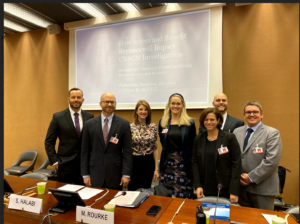Responding to Deliberate Biological Events
Overview
Recent infectious disease outbreaks have encouraged actions to strengthen global preparedness and response measures for naturally occurring outbreaks. Still, relatively little research has been done on the global community’s capacity to prepare and respond to the deliberate release of biological agents. Though there are clear parallels between the actions required for a response to natural outbreaks and the deliberate use of a biological agent, standard outbreak activities may be hindered or altered by the criminal nature of a deliberate biological event. Additionally, contrasted to the field of nuclear and radiological warfare where the responsibilities of lead agencies are fairly straightforward, there are a large number of United Nations and other international agencies that may have full or partial mandates to engage in the response to a biological event.
Because the coordination between different stakeholders is crucial to an efficient response, and because it remains unclear to what extent the deliberate nature of such an incident would affect the international response, our team has prepared the tools below to help clarify and conceptualize what a response to a deliberate biological event could entail.
Glossary of Terms for the Response to Deliberate Biological Events
This resource is a living document. If you have suggestions, edits, or additional links, please email Matt Boyce with your revisions and any relevant references.
Deliberate Biological Event Stakeholder Map
This tool describes how a deliberate biological outbreak might unfold, including the stakeholders who would be involved in identifying, responding to, and recovering from the event, and the policies that govern these efforts. Policy documents are identified as they become relevant during a notional event timeline, and those documents are linked to the stakeholders who draw their mandates from each policy document. The functional roles for each stakeholder are also identified, including affected and non-affected member States, UN and other international organizations, local and international NGOs, and private sector organizations would play as the event progresses.
Katz R, Graeden E, Abe K, Attal-Juncqua A, Boyce MR, Eaneff S. (2018). Mapping Stakeholders and Policies in Response to Deliberate Biological Events. Heliyon, 4(12), e01091.
Tabletop Exercise on the International Response to Deliberate Biological Events
In February 2019, in advance of the 2019 Munich Security Conference, the Center for Global Health Science & Security and partners from NTI, the Center for Global Development, and Talus Analytics convened a tabletop exercise with senior leaders geared toward identifying gaps and making recommendations to improve the global system for responding to deliberate biological events.
List of participants
A Spreading Plague: Lessons and Recommendations for Responding to a Deliberate Biological Event
Policy Document Library
This library compiled by the Center for Global Health Science and Security is intended to provide users with a comprehensive list of documents and mandates outlining the responsibilities of various UN agencies, NGOs, and IOs in the response to a DBE.
2021 BWC Meetings of States Parties Materials
At the Biological Weapons Convention – Meeting of States Parties 3rd Meeting, the Center for Global Health Science & Security made a statement supporting Art VI, VII & UNSGM investigations. Dr. Alexandra Phelan delivered the statement at 1:30:52 here:
https://media.un.org/en/asset/k1o/k1oe34oy8p
2021 BWC Meetings of Experts Materials
The Center for Global Health Science & Security has once again contributed to the annual NGO Statement, particularly for MX4, for the 2021 BWC Meeting of Experts. The statement was delivered by Dr. Alexandra Phelan in Mandarin Chinese at the Meeting of Experts on Assistance, Response and Preparedness (MX4). Watch Dr. Phelan deliver the statement at 2hrs:18min here: https://media.un.org/en/asset/k12/k12fp3xacn
Joint NGO Statements
NGO Statement on MX4 (Mandarin Chinese)
2019 BWC Meetings of States Parties Materials
The Center for Global Health Science & Security was invited to present at the 2019 MSP and launched a white paper, delivered an NGO statement, and presented a NGO catalog of assistance.
NGO Catalog of Assistance
NGO Statement
Side Event Presentation
White Paper (pdf)

2019 BWC Meetings of Experts Materials
The Center for Global Health Science & Security was invited to present at the MX4 Session of the 2019 BWC as a ‘Friend of the Meeting’ and also hosted an additional side event.
Assistance Database Presentation
Georgetown Infectious Disease Atlas Presentation
Georgetown Outbreak Activity Inventory Presentation
Munich Security Conference TTX Presentation
2018 BWC Meetings of Experts Materials
The Center for Global Health Science & Security hosted a side event and released a white paper on assistance following a deliberate biological event at the MX4 Session of the 2018 BWC.
White Paper
International Coordination for DBEs Presentation
Assistance Following a Deliberate Biological Event Presentation
Senior Level TTX on a Deliberate Biological Event Presentation
Global Biosecurity Dialogue Presentation
Other Materials
Joint NGO Statement to 2018 Biological Weapons Convention Meeting of States Parties
OIE Guidelines for Investigations of Suspicious Biological Events (English)
OIE Guidelines for Investigations of Suspicious Biological Events (French)
OIE Guidelines for Investigations of Suspicious Biological Events (Spanish)
Wilton Park Report | Responding to deliberate biological release: the requirements for effective, coordinated international action
Zanders JP. (2018). The Meaning of ‘Emergency Assistance’: Origins and negotiation of Article VII of the Biological and Toxin Weapons Convention. Ferney-Voltaire: The Trench.
Nalabandian M. (2019). Bridging Health and Security Sectors to Address High-Consequence Biological Risks. Atomic Pulse.
Contact
For questions, comments, or other inquiries about this line of work, please contact deliberatebio@georgetown.edu.


